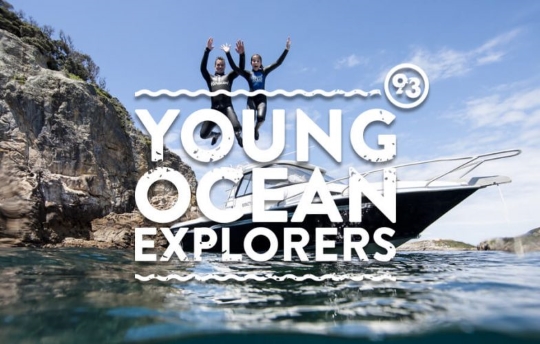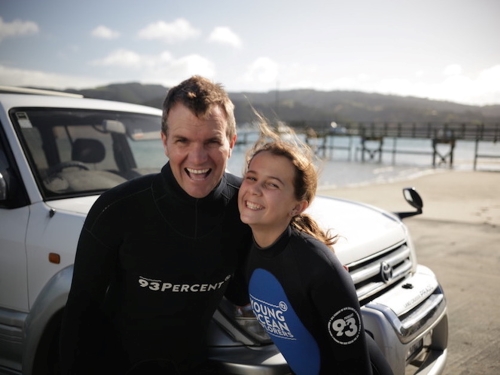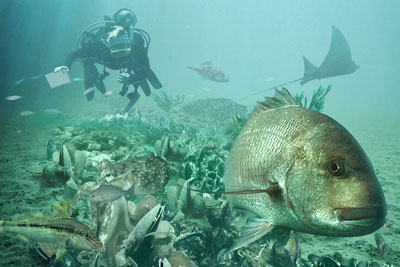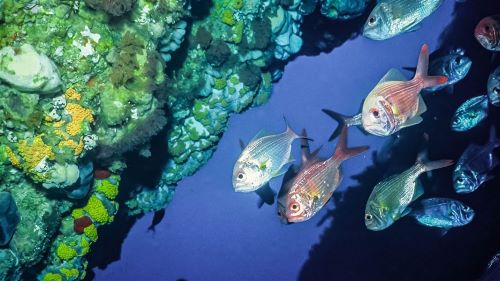.png)
There are many fantastic resources available for use during Seaweek. We have listed these as the ones most useful for teachers on this page but visit the other tabs for loads more! These links below contain learning material for everyone! Hope you enjoy the downloads, ideas, references and other resources.
LEARNZ Virtual Field Trip & Sustainable Seas Science Challenge
The LEARNZ website is loaded with interactive student experiences and a collection of New Zealand, contemporary digital resources for education. The team from LEARNZ have collaborated with the Sustainable Seas Science Challenge to develop a virtual field trip called “Sustainable seas – essential for NZ`s health and wealth”.

Explore marine science and kaitiakitanga in the Bay of Plenty: Travel with LEARNZ and the Sustainable Seas Challenge during Seaweek 2020 to discover what's threatening a taonga species in Ōhiwa Harbour, and how science and mātauranga Māori are being combined by local kaitiaki to understand – and address – the problem.
Explore our oceans and the issues affecting them on one of LEARNZ virtual field trips; there are lots of relevant topics and virtual field trips from the past which are still available online to explore.
Young Ocean Explorers Interactive Website

If you haven't discovered this new website from marine superstars the Young Ocean Explorers then you are missing out! Jam packed with videos, polls, quizzes and more this engaging resource is guaranteed to keep children exploring the underwater world for hours. An ideal teaching tool complete with a special guide for teachers and parents to help you make the most of this incredible resource!
Diving into Marine Resources Free Online Webinar

This free online professional development webinar, Diving into Marine Resources, is now live online! The Science Learning Hub is very excited to introduce Steve Hathaway, amazing underwater cameraman and the founder of Young Ocean Explorers, as our guest for this session.
Science Learning Hub Resources
The awesome folk at the Science Learning Hub have put together a special page full of specific resources for Seaweek! They also have a heap of other very relevant resources you might like to explore starring some Seaweek favourites:
Revive Our Gulf: The Power of Mussels Experiment Worksheet

Great resource from marine restoration group Revive Our Gulf is a worksheet for schools to enable teachers to easily show students the power of mussels as ecosystem engineers and water cleaners. Also included is a dissection guide for a lab class. View on the Science Learning hub or download the worksheet as a PDF.
How to Create A Marine Reserve Proposal
Trustee Vince Kerr has recently completed the first stage of a web site project for the Mountains Sea Conservation Trust community engagement programme. It is called: 'How to Create a Marine Reserve Proposal'
The idea is to use the experience that the Trust has gathered in a decade of advocating for marine conservation to gather all the information, documents, case studies, advice and educational resources into one place.
Marine Resources from University of Otago, NZ Marine Studies Centre
Did you know there are hundreds of marine-theme activities and resources that you can download free of charge from the NZ Marine Studies Centre website? Board games, crafts, shore activities, posters guides and worksheets - there is something to appeal to all ages!
In addition you can order copies of our printed booklets and guides, including:
Rocky Shore Teacher Activity Book
Rocky Shore Who Eats Who Educational Activity Book
Mudflat Mysteries Educational Activity Book.
Rocky Shore ID Guides (North and South Island Guides, in English and Māori)
Sandy and Muddy Shore ID Guides (North and South Island Guides, in English and Māori)
Check out our resources, and download an order form!
Marine Metre Squared Project
Visit mm2.net.nz to register and download all the resources you will need to do your own seashore surveys.
Identification Help: MM2 App
Go to www.mm2.net.nz/mobile/ to download the MM2 app.
If you've been using the Rocky Shore Guide or the Sandy and Muddy Shore Guide to do your Marine Metre Squared you will have found that they only cover a portion of what you might find… So the team at the NZ Marine Studies Centre have come up with an online guide that has more information on www.marinelife.ac.nz.
The Auckland Museum App (New Zealand Marine Life) and the NZ Marine Studies Centre have also done a Pinterest board with useful ID Books (https://www.pinterest.com/marinemetre2/identification-of-nz-seashore-species/)
Activity Guide for Collins Guide to the NZ Seashore
An amazing book by Sally Carson & Rod Morris, this NZ Seashore Guide is the perfect resource in any classroom. Find out more about The Collins Field Guide to the NZ Seashore here.
Useful activity guide for teachers to help them get the most out of this fantastic new book about the New Zealand Seashore. Full of ideas and entertaining and educational activities for students. You can download the activity guide here. All material available for free download by the New Zealand Marine Studies Centre.
Project Jonah's World of Whales Kit
Developing compassion and respect for marine mammals is key to what Project Jonah does. They believe children play a vital role in the future of these animals. Because they're serious about getting the message of animal welfare across, they've teamed up with Barbara Todd, to bring the magical world of whales and dolphins to you. Through the World of Whales educational resource kit, Project Jonah will help you teach kids about these animals and their environment, so they can play a bigger part in the protection of marine mammals in the future. See the kit in action here.The kit includes lesson plans on whales and other interactive resources and is FREE to all NZ schools. Read full details and order your own kit!
Twinkl Seaweek Resources for Age 0-3
Two pages of special Seaweek resources for the little ones are collected together in one handy place on the Twinkl website!
Department of Conservation's Marine and Coastal Resources

Habitat Heroes: Explore your local marine environment Inquiry unit | Levels: 1-4 | In the environment: This resource supports outdoor exploration of the marine environment. The activities can be adapted to suit your local context.
Harbours, bays and estuaries teaching resource Unit | Levels: 3-4 | About the environment: Learn about the species that depend on our estuaries - the places where freshwater and saltwater meet.
Marine reserves Unit | Levels: 3-4 | About the environment: Learn why a trip to a marine reserve is a great opportunity to study marine life in its natural habitat.
Our own gold coast Video and unit | Levels: 3-4 | About the environment: Explore the importance of sand dunes and the impact of losing them in this teaching resource. Find out about the largest coastal plant protection programme in the southern hemisphere.
Rocky reef snorkel survey teaching resource Unit | Levels: 3-4 | In the environment: Help your students learn about their local marine environment. View and download the rocky reef resource kit and teaching guide.
Tāiko/black petrel education resource Inquiry unit | Levels: 2-4 | About the environment: This resource is an integrated unit of teaching and learning material about the tāiko/black petrel and other seabirds, for use in primary schools.
Seabirds factsheets Factsheets | Levels: 2-4 | About the environment: These factsheets offer students an opportunity to explore the lives of seabirds. There are also lesson plans for teachers.
Seabird Identification Guide
It's Seaweek, so here's Forest & Bird's new seabird guide, especially for fishers. Download it here. The flyer features 15 of the most commonly seen (and caught) seabirds in the Hauraki Gulf and Bay of Plenty regions. It includes tips on how to avoid catching seabirds when fishing and ways to safely release them if you do. Would your organisation like extra copies to give away or distribute? If so, email Melissa to order your waterproof copies.
NIWA Teacher Resources
NIWA's educational resources and scientific data are tools for young people to learn about science. They provide a range of free online resources that cover the ocean, freshwater and coastline that can help you with classes during Seaweek.
Citizen science: large brown seaweeds
Marine scientists are calling on the public to help them get a better idea of the distribution of large brown seaweeds along New Zealand's coast. Brown seaweeds, including the familiar bull and bladder kelps and Neptune's necklace, are an important part of the coastal ecosystem. They provide shelter for other species and buffer the coast from waves and erosion. But little is known about their distribution, and NIWA scientists have launched a NatureWatch citizen science project to encourage people to post images and GPS location data for their local beaches. Marine biologist Roberta D'Archino says large brown seaweeds are disappearing from many sites throughout the world, but there is too little data to track their abundance along New Zealand's coastline. Such a baseline is necessary to monitor any changes in the future for any of the 12 species of brown seaweeds found in New Zealand. Kate Neill, who is also part of NIWA's coast and ocean group, says large brown seaweeds are underrepresented in museum collections because it is difficult to preserve large specimens in a herbarium. She says the distribution data is only one part of the project. The team also collects the seaweeds to culture them in the laboratory to test them under changing acidity, temperature, light and sedimentation conditions. They are also developing a camera system to monitor changes in seaweed beds in the shallower waters along the coast. The research is funded by the Ministry for Primary Industries. You can hear more about New Zealand's seaweeds in this Our Changing World story with NIWA's Wendy Nelson.
Creative Junk - Make your own Sea Creatures
The team at Creative Junk have created a special Pinterest Board with ideas on making sea creatures out of recycled junk specially for Seaweek!
A Visual Glossary of Ocean Terminology
Ocean conservation is essential but sometimes difficult to understand. The Pew Charitable Trusts joined forces with cartoonist Jim Toomey, the artist behind “Sherman’s Lagoon,” on 10 animated videos that explain the complicated concepts that guide efforts to protect our oceans. Photo: Richie Robinson
Science Learning Hub Primary Resources for Seaweek
With 75% of New Zealanders living within 10 km of the coast, marine science need not be limited to just 1 week. The Science Learning Hub has helpfully listed a sample of the Hub’s marine resources including a selection of unit plans and other teacher support materials that they have grouped under possible teaching topics. Use the Related Content links on each page to get the full story. http://sciencelearn.org.nz/Primary-Science/Seaweek-resources
Photograph the next King Tide
King Tides Auckland Initiative has developed a useful booklet to help you take awesome photos of the next king tide. Click on the link below to download and print the following “how to” booklet to capture an image of the next king tide: photo point “how to” booklet
Introduction to Snorkeling
A free guide for teachers from Watersafe Auckland Inc. for you to download here.
New Zealand Sea Lions: Free resource for teachers
The New Zealand Sea Lion Trust are offering a FREE education resource package for primary, intermediate and secondary school teachers or youth group/interest leaders. The pack includes a resource book for teachers : The New Zealand Sea Lion, Whakahao - Welcoming back a native treasure which is designed to support the education programme on sea lions that is offered at the New Zealand Marine Studies Centre at the University of Otago. It incorporates the big science concepts of conservation, sustainability, endangered species and food chains/webs and links to topics in the social sciences and maths curriculum. It also provides background information, resource material, curriculum links, pre-and post-trip activity suggestions and a reference list.
- An overview of the current dangers posed to the New Zealand Sea Lion by the methods that the squid fishery currently use
Members of the Trust are also available to come to your school/youth or interest group to give a talk about the latest research and issues. For more information on the New Zealand Sea Lion Trust or to order your free education resource package, please email sealiontrust@clear.net.nz
Marine Biosecurity Website
Find information on marine pests in New Zealand waters. Search collated national data and read about research and management of marine pests in New Zealand.
NZ-VR Project
NZ-VR is a project undertaken by New Zealand Geographic, Sir Peter Blake Trust, The Pew Charitable Trusts and Foundation North’s GIFT fund, using virtual reality to connect New Zealanders with their environment and inspire social change at scale. The team is in production on five wild places of a proposed 20 that, together, will provide a virtual experience of every biome in New Zealand—from our mountain peaks to our deep seas. Check out the trailer here: http://vr.nzgeo.com
Teaching resources and education for sustainability
Te Kete Ipurangi: Teaching resources and education for sustainability links and help. Check out the resources by going to the EFS kete, curriculum resources and tools and finding the Ministry of Education NCEA resources page, looking under Teaching Tools.
Water Safety Resource for Early Childhood from Watersafe Auckland
History and Traditions of the Sea - The sea is important for many people in New Zealand. However, over the years the uses and traditions have changed significantly. This guide looks at transport, fishing and the recent increase of recreational activities. Download it here. Plus more resources in the Teachers Toolbox.